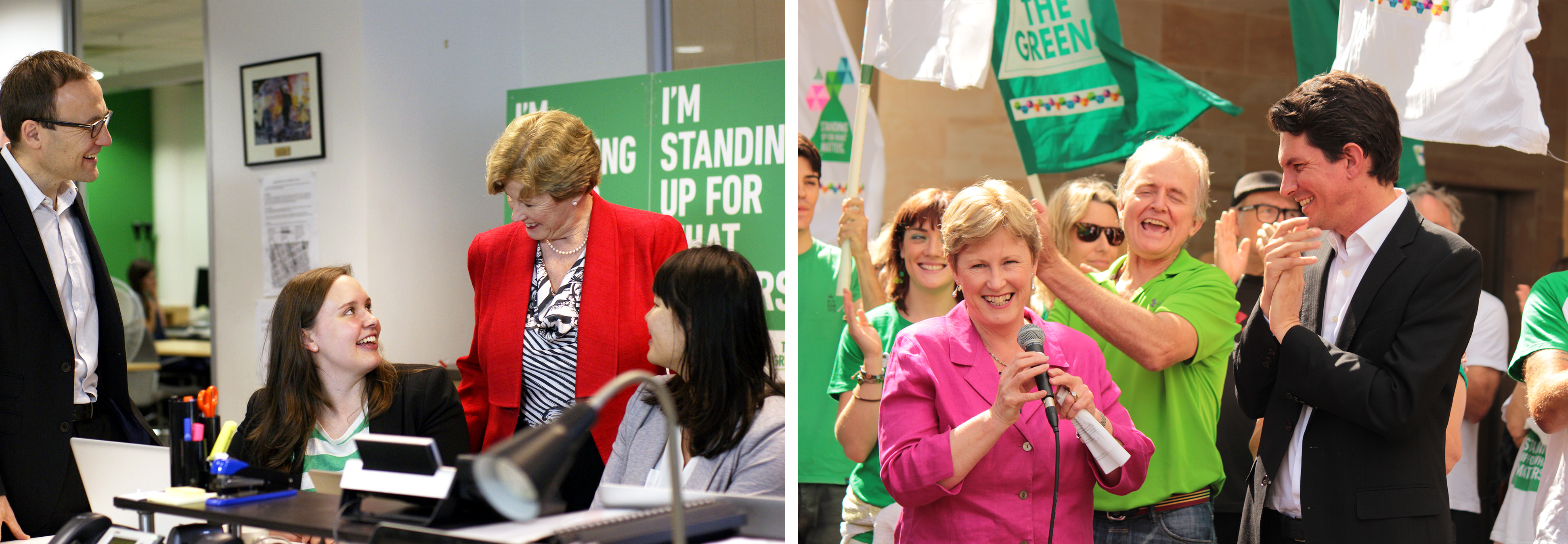After thirty years, the Greens have much to celebrate. But this is a turning point in history, and we don’t have another thirty years of the ‘business as usual’ politics that we have had to work within.
BY CHRISTINE MILNE
Leader of the Australian Greens, 2012–2015
“We are now faced with the fact that tomorrow is today. We are confronted with the fierce urgency of now. In this unfolding conundrum of life and history, there is such a thing as being too late. This is no time for apathy or complacency. This is a time for vigorous and positive action.”
― Martin Luther King Jr.
n the early 1990s, the Green Independents in Tasmania produced a sticker: ‘Go Go Green Government’. We were so excited by what we had been able to achieve with stopping the Wesley Vale native forest chlorine bleaching pulp mill, achieving balance of power in the Tasmanian Parliament and doubling the Tasmanian Wilderness World Heritage Area. With vigorous and positive political action, anything and everything seemed possible.
The old parties were scornful but we were filled with hope and optimism. Thirty years later we know neoliberalism punctured the possibilities of that time, but nothing quenched our belief that the planet and people need the Greens’ vigorous and positive action to secure the future.
Since then, Green parties based on ecology, social justice, peace and nonviolence, and participatory democracy formed in every Australian state and territory, and nationally. The Australian Greens then inspired and drove the formation of the Global Greens.
Twenty one years later, we have Green parties in over one hundred countries around the world, all signatories to the Global Greens Charter. We are currently part of the governments of Germany, Ireland, Finland, Austria, Luxemburg, Belgium and New Zealand. In international negotiations on climate and biodiversity, we have Greens ministers at the table. From the early days of ‘think globally, act locally’ our modus operandi has become ‘think and act globally and locally at the same time’.
After thirty years we have much to celebrate. Everywhere in the world where democracies exist, and more so where proportional representation is in place, we have record numbers of elected members at every level of government. We have laws and societal shifts that would not have happened without the Greens, and while we can – and should – take a moment to celebrate, it can only be a moment.

Throughout our history as Greens, in spite of our best efforts to contest every facet of neoliberalism, we have not won the global battle of ideas that emerged as Keynesian economics frayed and the glaring absence of any environmental focus in political and economic discourse became obvious. As Victor Hugo said, “There is nothing so powerful as an idea whose time has come” – and tragically for the planet, neoliberalism’s time arrived in the 1970s and flourished until now.
It was no accident. Neoliberalism or free market capitalism had been well funded, building influence, and waiting to take advantage of a crisis since WWII. Its proponents were ready. They didn’t need a war – they organised around an idea at a time when people were listening.
“We have laws and societal shifts that would not have happened without the Greens.”
Followers of Hayek, Friedman and Buchanan like the the Koch brothers and the Murdochs, together with their think tanks from the American Enterprise Institute and the Heritage Foundation to the Australian Institute of Public Affairs, methodically and successfully brought about the most radical, systemic global change in the past fifty years.
Their neoliberalism expressed as the supremacy of the market, deregulation, competition and small government has infiltrated every level of government and society such that – in spite of opposition from the Greens, environmentalists and social justice advocates – they have brought the planet and society to the brink of collapse.
Yet they have done it in such a methodical, holistic way and at such a global scale that most people don’t even realise that it has been a calculated, funded and strategic takeover of the global mindset. In fact, most people don’t remember a time before privatisation, deregulation, competition, infinite growth, individualism and consumerism. The whole system is geared up to deliver it.
But now apocalyptic bushfires, repeated torrential rain, devastating floods, extinctions, pandemics, refugee crises, homelessness, inequality and poverty have shaken people’s complacency and faith in the markets. People are confronted with the systemic breakdown of our climate, biodiversity, democracy, economics and society.
Nine of the 15 irreversible tipping points of global warming have been triggered. People know we are plunging into the unknown. Going about their daily lives, they are anxious. They know that without a stable climate, functioning ecosystems, forests, oceans, clean air, water and uncontaminated soil, they can’t live, let alone feed their families or afford a home.


n 2022, people all around the world are really listening for the first time in decades. They know neoliberalism has utterly failed them. They are exhausted and desperate to hear what could come next; what might work to protect and restore the global commons. Sick of individualism, they want to feel part of a society pursuing the common good and want to stop being treated as a consumer in an economy.
People who have never voted anything but LNP or Labor are prepared to vote differently for the first time. A third of the Australian electorate demonstrated that at the last election. This is huge. We have the strong Green philosophical framework, narrative and policy prescriptions proposing the solutions. We need to grab their attention and inspire them with enough confidence to believe we can deliver.
Political vacuums are quickly filled. Authoritarianism is rising as inequality undermines people’s faith in democracy and tempts them to rely on ‘the strong man’ to save them. Some fall back to good left- or right-leaning local independents who will look after their backyard.
Are we Greens ready to tell them that when you vote Green you join a huge network of influence and are represented locally, at state and national level, and globally?
Are we ready to tell them that when you vote Green you know exactly how your representative will vote in the Parliament because we are not captured in an age where democracy has given way to plutocracy?
But fundamentally, are we ready to tell a generation hungry to hear it that when you vote Green, you are voting for a party that understands at its core the reasons for the planetary and social breakdown that is now happening – and is ready to do what it takes to turn things around?
hat the Australian Greens do now matters as never before. We don’t have the luxury of time. Now is a breakthrough moment of global and local threat, and opportunity for life on Earth and the people who speak for it. As Australian Greens, we have to seize the moment. The federal election was a litmus test. The Victorian and NSW elections must be a step change.
We don’t have another thirty years of the ‘business as usual’ politics that we have had to work within. We are not in politics to be a greener shade of the status quo; to be a more authentic social democratic party than what is on offer; to gradually build numbers until we reach government to do what needs to be done. We are a Green party, distinguished from social democratic parties by our focus on the environment.
“What the Australian Greens do now matters as never before.”
There needs to be a radical shift to emergency mode, to ‘all hands on deck’ for survival. We have run out of time. Young people know it; we know it.
We need to win and use every bit of political power we have right now, to legislate for radical systemic change that puts the planet, its climate and biodiversity centre stage, and puts justice at the heart of the society and the political solutions that we propose and deliver.
I know some Greens will worry that being ‘radical’ will put people off voting for us. But being radical does not mean being antisocial or violent. It means delivering through politics the powerful idea that challenges the status quo, just like the neoliberals did. It means taking the the strong and vigorous legislative action that is necessary now in spite of the current political imperative of incrementalism or the criticism of making ‘the perfect the enemy of the good’.
As Greta Thunberg said, ‘the good’ in climate terms is not safe and is closer to black comedy than reality. It means going for it; mustering the courage and conviction of Greens to say and do what is necessary now because we know that ‘there is such a thing as being too late.’ It is both an exciting and daunting prospect.
Back in the 90s we not only had a sticker anticipating Green government – we had a poster that read, ‘the future is green or not at all’. In 1990 it was prescient, in 2022 it is a truism, and by 2050 we will know which turns out to be.
For the Australian Greens and our colleagues around the world, this is a turning point in history we share; we feel the fierce urgency of now. We have been preparing for this for thirty years. We have built the political movement, we have the political experience and, critically, we have the power of an idea whose time has come. ‘Now’ is our today and our tomorrow.